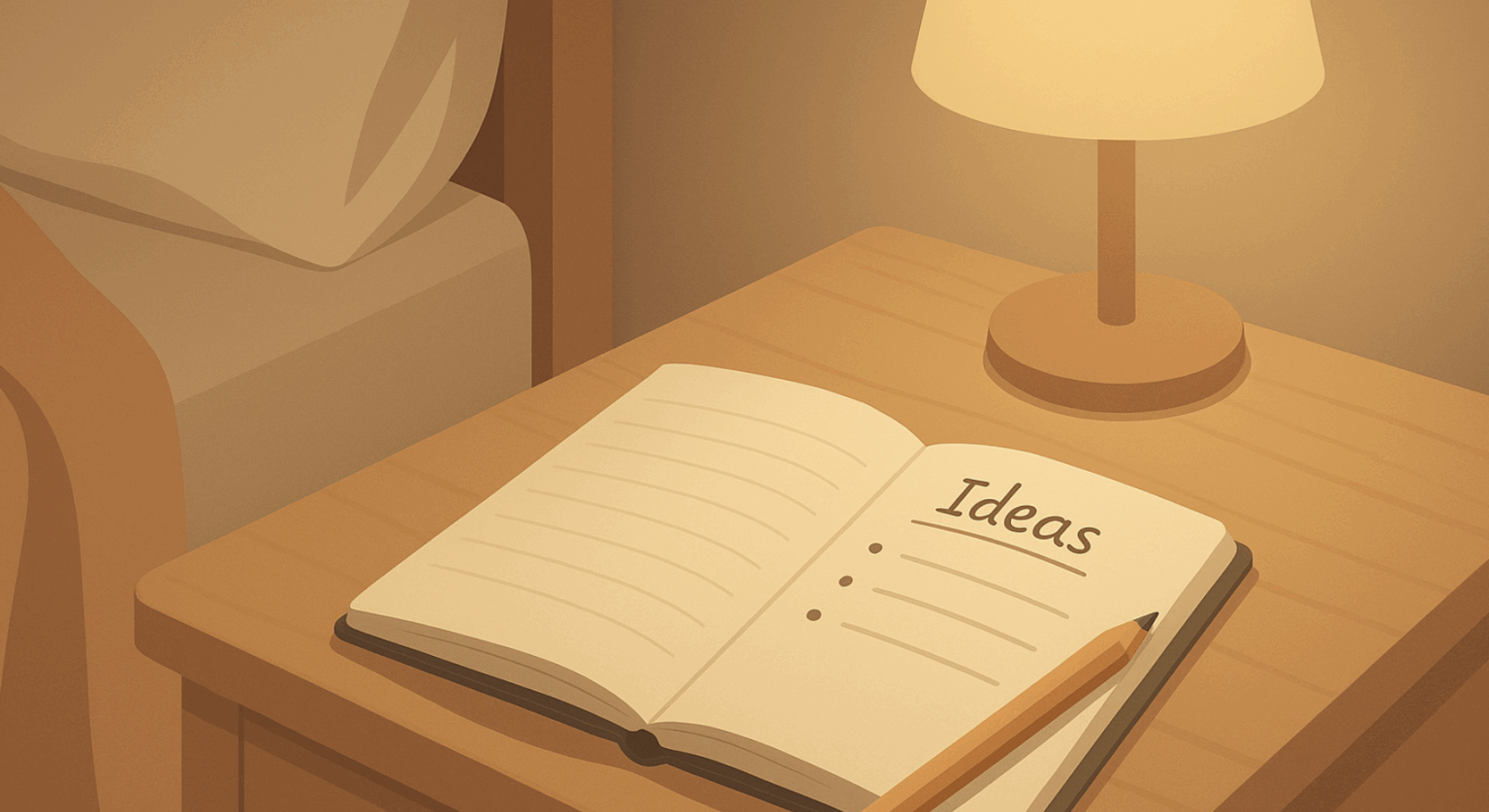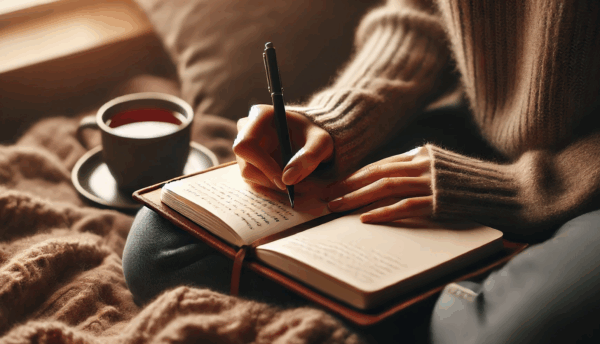Ah, the life of a writer: one day, you’re a fountain of inventive plots; the next, you’re staring into the abyss of a blank page, wondering if your muse has taken early retirement. Fear not!
Whether you’re stuck in a creative drought or simply dodging the well-worn paths of clichéd rainy-day tales, we’ve got the juice to kick-start your imagination. And if you’re looking for a little extra help shaping your story, even successful ghostwriters need a spark to get started, these ideas are for you, too.
It’s a common plight, indeed, research indicates that 71% of writers sometimes or occasionally experience writer’s block, with a further 24% almost always ensnared by it. These aren’t just any story prompts; they’re your ticket to crafting gripping narratives in genres as diverse as sci-fi, romance, and everything in between. Let these ideas be your beacon through the fog of uncertainty, guiding you back to the shores of creative success.
From short story ideas that could fit on a cocktail napkin to epic plots worthy of a saga, our 25 dynamite prompts are here to catapult your creativity back into orbit. Dive into these prompts with teeth, drama, and ample space for your unique voice to echo through the ages. You may even end up delving deeper into crafting your narratives, understanding the spectrum of popular story types can enhance how you bring these ideas to life.
How to Use Writing Prompts Effectively
Let’s be honest: as writers, we’re not short on ambition, just sometimes on direction. A great story idea might feel elusive, and that blinking cursor can feel more like a taunt than an invitation. That’s where writing prompts come in. Think of them as the creative equivalent of a double espresso: a quick, energizing push to get your brain firing on all cylinders.
But how do you actually use prompts effectively? It’s not just about taking an idea and running with it. It’s about letting that spark connect with your voice, your experiences, and the worlds you want to build. Here’s how:
- Make It Yours: A prompt is just the starting line, not the finish. Whether it’s about a young woman on a blind date or a police officer solving a peace treaty mystery, twist the idea until it feels personal.
- Set the Stage: Don’t overthink it. Sometimes the best stories come from diving in without knowing the ending. Use the prompt to write your way into discovery. Who knows? Maybe your interesting story will take a turn you didn’t see coming.
- Experiment Freely: Ever wanted to dabble in sci-fi, historical fiction, or even something as wild as an existential crisis on a home planet? Prompts are perfect for testing the waters of new genres without pressure.
- Stay Playful: Writing is work, but it’s also meant to be fun. A good writing exercise is like a playground for your imagination, no rules, just ideas.
- Use It as a Launchpad: Not every prompt will lead to a great short story, but they might surprise you. Maybe that strange alternate reality concept turns into a subplot or the kernel of a bigger project.
So, grab a prompt, grab your coffee, and let’s get writing. You might just find your next big idea hiding in plain sight.
Your Publishing Journey Awaits – Start NowThe Power of Story Prompts: 25 Inspiring Ideas
Here are 25 carefully crafted writing prompts to help you find your next great story idea, maybe even with the help of a writing coach. Each one comes with a spark to get you started, along with a tip to help you turn it into a compelling tale.
1. A Blind Date Mystery
A character shows up for a blind date, but the person they meet seems to know too much about their life—more than they’ve ever shared with anyone. This prompt works because it combines everyday relatability with an immediate sense of intrigue and suspense.
Begin with: “I don’t usually do blind dates, but when the stranger mentioned my sister’s nickname from childhood, I froze.”
2. Walking Into the Past
While exploring a flea market, a young woman buys a locket that pulls her into the life of its former owner—a life set in an ancient society. This idea works because it blends the charm of nostalgia with the excitement of historical adventure.
Begin with: “The locket was rusted and ordinary—until the world around me vanished.”
3. The Most Interesting Job in the World
Write about someone whose day job seems ordinary but hides incredible secrets—like a librarian who safeguards books that rewrite themselves. This prompt works because it combines the mundane with the fantastical, creating limitless storytelling opportunities.
Begin with: “The new assistant wasn’t supposed to notice the locked room behind the stacks.”
4. An Alternate Reality Road Trip
A group of friends takes a road trip, only to discover they’ve crossed into an alternate reality where everyone they meet looks familiar but acts completely different. This idea works because it turns a familiar activity into a thrilling, unpredictable adventure.
Begin with: “It wasn’t until the gas station attendant called me by a name I didn’t recognize that I knew something was wrong.”
5. The Family Treasure Trove
When a family moves into a decrepit old house, they discover a diary in the attic that maps out a hidden treasure—but following the clues seems to awaken something sinister. This prompt works because it combines familial dynamics with a compelling mystery.
Begin with: “My sister was the first to suggest the diary’s map might lead to something real.”
6. The Forgotten Peace Treaty
A police officer uncovers an old peace treaty between humans and an alien race, and the fragile truce is now on the verge of breaking. This works because it places a character in the middle of an impossible moral and political conflict.
Begin with: “The treaty wasn’t supposed to exist, but the old documents told a different story.”
7. The Music That Changed Everything
A famous artist wakes up one morning to find that they’ve lost their hearing—until they discover they can see music in color. This idea is powerful because it explores the relationship between art, identity, and transformation.
Begin with: “The silence was complete, until the first wave of color burst across the walls.”
8. The Secret of the New Neighbor
Your new neighbor seems perfectly ordinary until you accidentally discover they’ve been writing anonymous bestsellers based on real people in the town. This works because it mixes small-town intrigue with a dash of voyeurism and creativity. This is also a great one for short story ideas!
Begin with: “I found the manuscript on a USB drive labeled with my initials.”
9. A Character Discovers Their Family’s Past
After inheriting an old trunk from a family member, a character uncovers letters that suggest their ancestors were involved in a long-buried conspiracy. This prompt shines because it weaves personal history into a larger, suspenseful narrative.
Begin with: “The first letter started with a warning: ‘If you’ve opened this, it’s already too late.’”
10. Existential Crisis on a Home Planet
A young boy growing up on an alien planet realizes he doesn’t belong when he starts having memories of Earth. This works because it explores identity and belonging against a fantastical backdrop.
Begin with: “The dream always started with trees, a thing I had never seen but somehow knew.”
11. The Blind Date With a Twist
Your protagonist meets their date at a quaint café, but the date seems to have no memory of who they are—or why they’re there. This works because it combines an ordinary setting with a mysterious and unsettling twist.
Begin with: “He smiled at me, confused, and asked, ‘Do I know you?’”
12. The Sci-Fi Artifact
A team of archaeologists discovers an ancient artifact that appears to be from a home planet they’ve never heard of. This prompt works because it merges exploration with science fiction, opening the door for unexpected discoveries.
Begin with: “The artifact hummed softly, as if it were alive.”
13. When the World Stopped Moving
One day, the Earth inexplicably stops rotating. Society begins to crumble, and your protagonist must navigate the chaos while trying to protect their loved ones. This prompt works because it blends survival with character-driven tension.
Begin with: “We noticed it first in the shadows—they stopped shifting, even as the sun hung in the sky.”
14. The Job No One Wants
Your protagonist takes a day job cleaning up after a mysterious organization, only to discover they’re disposing of evidence from alternate realities. This idea works because it combines ordinary work with extraordinary stakes.
Begin with: “The first bag I opened contained a diary with my name on the cover.”
15. The Treasure Map That Changes Everything
A young woman finds a treasure map hidden inside a library book, but it leads to something far more dangerous than gold. This works because it combines the thrill of discovery with suspense and danger.
Begin with: “The map was crudely drawn, but one word stood out: ‘Beware.’”
16. The Character-Driven Apocalypse
Your protagonist knows the world is ending in ten years, but everyone else has just found out today. This works because it creates a fascinating moral and emotional dilemma for your character.
Begin with: “I had ten years to prepare for this moment, but I still wasn’t ready.”
17. Beautiful Music in a Strange World
A character discovers they can create beautiful music that heals people—but only in a world they visit in their dreams. This works because it blends creativity and escapism with emotional resonance.
Begin with: “In my dreams, the piano keys glowed, and every note fixed something broken.”
18. The Best Friend Betrayal
Your protagonist’s best friend vanishes without explanation, leaving behind a series of cryptic clues. This works because it combines a personal relationship with a gripping mystery.
Begin with: “Her last message was a single word: ‘Run.’”
19. The Small Town With a Big Secret
Your protagonist moves to a small town where everyone seems to know something they’re not telling. This works because it creates an eerie, suspenseful atmosphere ripe for discovery.
Begin with: “They all smiled too much, but no one would answer my questions.”
20. The Life of a Famous Artist
Write the life story of a famous artist who is secretly creating their masterpieces with forbidden techniques. This works because it explores the moral and emotional costs of genius.
Begin with: “His hands trembled as he poured the last of the strange liquid onto the canvas.”
21. The Police Officer’s Last Case
A retiring police officer takes on one final case, but it quickly becomes personal in unexpected ways. This works because it combines high stakes with a deeply human story.
Begin with: “The file on my desk wasn’t supposed to exist.”
22. A Family Moves Into a Haunted House
A family moves into a house with a dark past, and strange things begin to happen almost immediately. This works because it taps into classic horror while allowing for unique twists.
Begin with: “The first night, we heard footsteps in the attic—but no one was up there.”
23. A Road Trip to Another World
A group of strangers on a road trip discover they’ve crossed into a world where the laws of physics no longer apply. This works because it combines adventure with surreal, imaginative storytelling.
Begin with: “The road ahead shimmered like water, and we couldn’t turn back.”
24. A Peace Treaty on the Brink
Your protagonist is tasked with negotiating a fragile peace treaty between two warring factions—one human, one alien. This works because it combines political tension with a character’s internal struggles.
Begin with: “Both sides looked to me, and I realized I couldn’t trust either of them.”
25. A Famous Artist’s Secret Life
A reclusive artist creates their masterpieces by channeling memories of people who have mysteriously disappeared. This works because it blurs the line between creativity and danger.
Begin with: “The paintings weren’t just lifelike—they were alive.”
Once you’ve chosen a prompt and started fleshing out your story, the next step is captivating your audience with a winning book description. Learn how to craft engaging descriptions with our guide on How to Write a Winning Book Description.
Why Writing Prompts Work: Unlocking Creativity
Writing prompts are more than just fun ideas—they’re a proven tool for sparking creativity and breaking through mental blocks. Psychologists suggest that when we encounter a new challenge, like a creative prompt, our brain enters a problem-solving mode. Prompts stimulate the prefrontal cortex, encouraging connections between previously unlinked ideas, and helping you to see your story from a fresh perspective.
Prompts also tap into the power of constraints. By giving your imagination a specific focus—whether it’s a young boy on a home planet or a police officer uncovering a peace treaty—you bypass the paralysis of endless possibilities and dive straight into creation. They’re especially useful for exploring themes, characters, and settings you might not think to write about on your own.
Consuming great short stories can further fuel this process. By reading, you absorb the rhythms of storytelling, character development, and plot pacing. Pair this with writing exercises, and you create a cycle of inspiration and growth. Prompts are the foundation, and the practice of writing strengthens your skills, transforming good ideas into polished narratives.
5 Pro Tips for Crafting Great Stories
Turning a writing prompt into a fully realized story takes more than just inspiration, it requires strategy and practice. Here are some tips to help you make the most of your ideas and craft compelling narratives:
1. Start Small and Build Big
Don’t pressure yourself to write an entire story in one go. Begin with a single scene or a key moment inspired by the prompt. Once you’ve captured the tone and voice, you can expand outward, layering in plot and character depth.
2. Focus on Characters
Great stories are driven by compelling characters. Even if your prompt is about a high-stakes event—like an alternate reality road trip—ask yourself how the characters feel, react, and grow throughout the story. What are their fears, motivations, and flaws?
3. Play With Genre
Experimenting with different genres can unlock fresh perspectives. A small-town mystery might work equally well as a horror story, a comedy, or even a romance. Let the prompt guide you, but don’t be afraid to twist it in unexpected ways.
4. Edit With Purpose
Your first draft is just the beginning. Revisit your story with a critical eye, looking for ways to strengthen its core themes and tighten the pacing. Good writing comes from rewriting.
5. Take Inspiration From Real Life
Combine the spark of the prompt with elements from your own experiences or observations. This adds authenticity and emotional resonance to your narrative, making it truly unique.
By combining creativity with these practical techniques, you’ll transform any writing prompt into a story worth sharing. Your next great short story might just be a few words away!
FAQ: Story Ideas
Q: What is a good plot for a story?
A good plot should involve a clear conflict or challenge that the protagonist must navigate, offering twists and emotional depth to keep the reader engaged. It should evolve with escalating tension and lead to a satisfying resolution.
Q: How do I start a story?
Starting a story effectively involves capturing the reader’s interest right away, whether through an intriguing scene, a compelling character, or a unique setting. Begin with action or a pivotal moment to hook the reader immediately.
Q: What are novel ideas?
Novel ideas refer to new, original, and creative concepts for writing that can potentially transform into expansive narratives or plots. They should offer fresh perspectives or explore uncharted thematic territory to stand out in the literary landscape.
Q: How to create a good plot?
Creating a good plot requires careful planning of the main events, character development, and the conflicts that drive the narrative forward. Consider structuring your plot around a classic narrative arc with a clear beginning, middle, and end to ensure cohesiveness.
Q: What are some good fictional story ideas?
Good fictional story ideas can range from exploring complex relationships in a realistic setting to constructing elaborate worlds in fantasy or sci-fi genres. The best ideas often challenge the norm, introduce new types of conflicts, or reinterpret familiar themes.
Q: How do I decide what story to write?
Deciding what story to write can stem from personal passion, a specific message you wish to convey, or an exploration of characters or settings that fascinate you. Consider what excites you as a writer and what you believe will resonate with readers.
Q: What are good story ideas for kids?
Good story ideas for children’s books often involve elements of adventure, wonder, and lessons about life and relationships, tailored to be understandable and engaging for a younger audience. They should be imaginative yet relatable, often incorporating a moral or learning outcome.
Q: How to come up with story ideas?
Start with questions instead of plots: “What if…?”, “Why did they do that?”, “What would happen if this went wrong/right?”. Note down interesting people, places, and moments from real life, then exaggerate or twist one detail. Combine two unrelated things (a breakup + a space mission, a bakery + a secret society) and imagine the conflict. Keep an idea list on your phone and add to it daily, small sparks often grow into full stories later.







